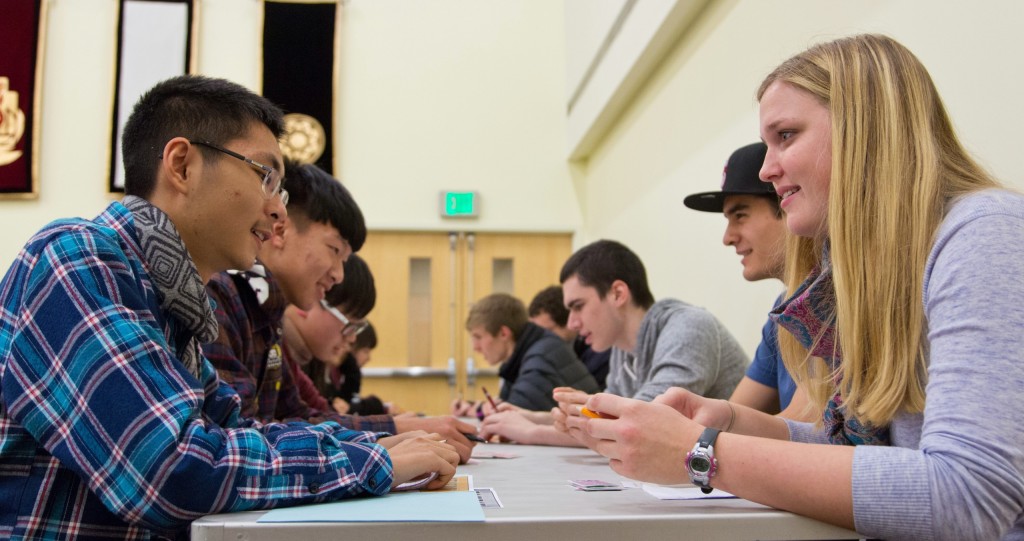Page 447 • (12,539 results in 0.042 seconds)
-
tissues, and auditory information (patient voice, heart tones, bowel and lung sounds). The student must be able to modify decisions and actions when dictated by new relevant data or after analysis of existing data. The student should be capable of recognizing and responding appropriately to life-threatening emergencies. Communication The student must communicate effectively verbally, non-verbally, and in writing in a timely manner with other students, faculty, staff, patients, family, and other
-

Association is recognizing achievement and quality in commitment to argumentation and public advocacy. The award is a recognition of top scholarship within the Speech and Debate practice area of Forensics. “Dr. Eckstein’s “Sound Arguments” is pushing the study of argument in exciting new directions. Especially in the world in which we now live, many arguments are indelibly tied to sound – to the sound of someone’s voice (one thinks of Churchill), to music (one thinks of advertisements), or to the absence
-
analysis of existing data. The student should be capable of recognizing and responding appropriately to life-threatening emergencies. Communication The student must communicate effectively verbally, non-verbally, and in writing in a timely manner with other students, faculty, staff, patients, family, and other healthcare professionals. He or she must be able to express ideas clearly and must be open to giving and receiving feedback. The student must be able to convey and exchange information regarding
-
from images of the body surfaces, palpable changes in various organs and tissues, and auditory information (patient voice, heart tones, bowel and lung sounds). The student must be able to modify decisions and actions when dictated by new relevant data or after analysis of existing data. The student should be capable of recognizing and responding appropriately to life-threatening emergencies. Communication The student must communicate effectively verbally, non-verbally, and in writing in a timely
-

inquisitive prompts from a card game called The Ungame: from, “How do you feel when someone calls you names? How do you react?” to, “Do your friends ever try to talk you into doing things that are wrong?” Then they moved on to another student, and another question. “I played Nirvana on my DVD player,” said event organizer and host Professor Mahlon Meyer. “When they heard the music, they stood up and moved. Then when I stopped the music, they quickly found a place to sit down. They all really had a good
-
Gina Gillie Professor of Music - French Horn Full Profile 253-535-7607 gilliegc@plu.edu
-

magic, I also believe in tough-minded examinations of the thematic and formal elements that we use as writers. As a teacher, I prefer discussions in which everyone seems to have a lab coat on, detailing the mechanics of the work at hand. How a piece achieves its force through writerly decisions—decisions which have been guided by thought and feeling, insight and intuition, analysis and imagination, failure and risk—this is what I care about. As a necessary complement to the writer’s solitary work
-

. Even though I believe that a strong piece of writing generates something like magic, I also believe in tough-minded examinations of the thematic and formal elements that we use as writers. As a teacher, I prefer discussions in which everyone seems to have a lab coat on, detailing the mechanics of the work at hand. How a piece achieves its force through writerly decisions—decisions which have been guided by thought and feeling, insight and intuition, analysis and imagination, failure and risk—this
-

magic, I also believe in tough-minded examinations of the thematic and formal elements that we use as writers. As a teacher, I prefer discussions in which everyone seems to have a lab coat on, detailing the mechanics of the work at hand. How a piece achieves its force through writerly decisions—decisions which have been guided by thought and feeling, insight and intuition, analysis and imagination, failure and risk—this is what I care about. As a necessary complement to the writer’s solitary work
-

magic, I also believe in tough-minded examinations of the thematic and formal elements that we use as writers. As a teacher, I prefer discussions in which everyone seems to have a lab coat on, detailing the mechanics of the work at hand. How a piece achieves its force through writerly decisions—decisions which have been guided by thought and feeling, insight and intuition, analysis and imagination, failure and risk—this is what I care about. As a necessary complement to the writer’s solitary work
Do you have any feedback for us? If so, feel free to use our Feedback Form.


